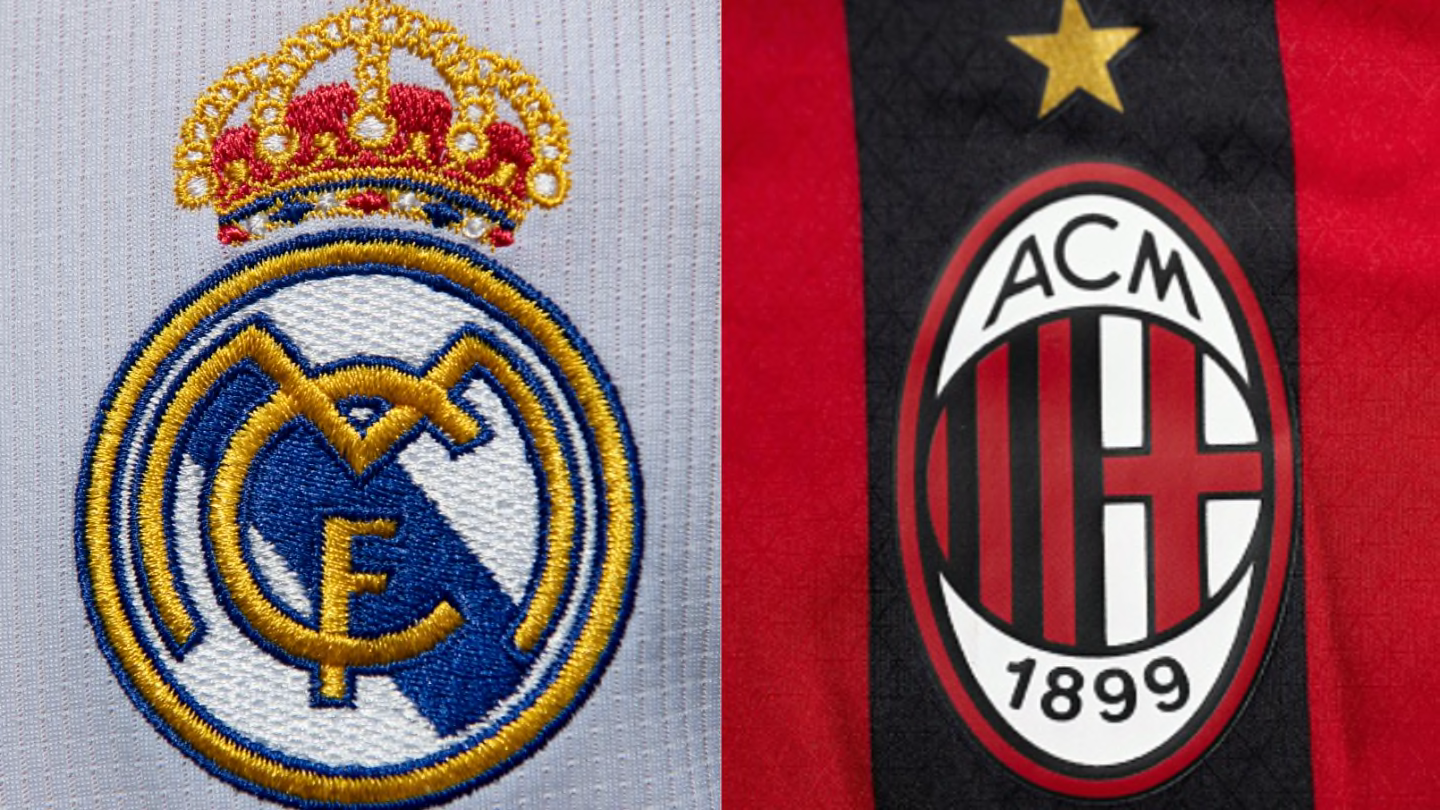When Real Madrid meets AC Milan, it’s more than just a football match. It’s a meeting of two of the most prestigious clubs in the history of European football. Over the decades, both clubs have built a legacy of success, dominating the UEFA Champions League and cementing their place in football folklore. As these two European giants face off, the Real Madrid vs AC Milan lineups are often scrutinised, offering insights into the tactical approaches, player roles, and strategies that will define the game.
In this article, we’ll examine the Real Madrid vs. AC Milan lineups, analysing recent encounters, examining their tactical setups, and exploring how each team’s squad reflects its current strategies. By reviewing key players, formation choices, and managerial philosophies, we’ll explore how the lineups shape the flow of these iconic fixtures.

The Historic Rivalry: Real Madrid vs AC Milan
Before diving into the tactical analysis, it’s essential to understand the history that has defined the encounters between Real Madrid and AC Milan. These two clubs have shared the stage in countless memorable European competitions, with both clubs staking claim to the title of Europe’s elite.
- Real Madrid: With 14 UEFA Champions League titles, Real Madrid is the most successful club in European football.
- AC Milan: With 7 Champions League titles, AC Milan is second only to Real Madrid in terms of European glory.
While their successes on the continental stage mark the rivalry between these two clubs, the tactical approaches and the players who have graced their lineups have been equally important in shaping these encounters. Over the years, the lineups have evolved significantly, reflecting both teams’ tactical adaptability and the changing trends in world football.
Analysing Recent Real Madrid vs AC Milan Lineups
Let’s focus on a recent high-profile match between Real Madrid and AC Milan. This example will give us insights into how both clubs approach such a high-stakes fixture in the modern era.
✅ Real Madrid Starting XI (4-3-3 Formation)
| Position | Player |
| Goalkeeper | Andriy Lunin |
| Right Back | Dani Carvajal (C) |
| Center Back | Antonio Rüdiger |
| Center Back | Éder Militão |
| Left Back | Ferland Mendy |
| Defensive Midfield | Aurélien Tchouaméni |
| Central Midfield | Luka Modrić |
| Attacking Midfield | Jude Bellingham |
| Right Wing | Rodrygo Goes |
| Left Wing | Vinícius Júnior |
| Center Forward | Kylian Mbappé |

Manager: Carlo Ancelotti
Formation: 4-3-3 (with variations to 4-2-3-1 in attack)
✅ AC Milan Starting XI (4-2-3-1 Formation)
| Position | Player |
| Goalkeeper | Mike Maignan |
| Right Back | Davide Calabria (C) |
| Center Back | Fikayo Tomori |
| Center Back | Malick Thiaw |
| Left Back | Theo Hernández |
| Defensive Midfield | Ismaël Bennacer |
| Defensive Midfield | Tijjani Reijnders |
| Right Wing | Christian Pulisic |
| Central Attacking Midfield | Yunus Musah |
| Left Wing | Rafael Leão |
| Striker | Olivier Giroud |
Manager: Paulo Fonseca
Formation: 4-2-3-1 (with high pressing and quick counters)
Real Madrid’s Tactical Setup
Under Carlo Ancelotti, Real Madrid has evolved into a well-oiled, attacking machine that blends youthful exuberance with veteran leadership. Their 4-3-3 formation provides a balanced platform for both defence and attack while offering the flexibility to shift to a 4-2-3-1 when necessary.
Key Tactical Features:
- Midfield Dominance: Players like Luka Modrić and Aurélien Tchouaméni control the tempo of the game. Modrić, with his passing range and vision, is the orchestrator, while Tchouaméni provides defensive stability and dynamic runs.
- Attacking Width: Rodrygo and Vinícius Júnior provide natural width on the wings, stretching the opposition and opening space for Kylian Mbappé, who plays as the central striker.
- Pressing: When not in possession, Real Madrid employs a high press to win the ball back quickly. This pressure is a crucial element of their attacking strategy, especially in transition.
AC Milan’s Tactical Approach
AC Milan’s tactical setup under Paulo Fonseca relies heavily on a solid defensive foundation and quick transitions. The 4-2-3-1 formation allows Milan to absorb pressure while maintaining defensive stability through the midfield duo of Ismaël Bennacer and Tijjani Reijnders.
Key Tactical Features:
- Compact Defence: Milan’s defensive strategy is rooted in a deep, compact shape that makes it difficult for opposing teams to break them down. This defensive solidity is supplemented by Theo Hernández and Davide Calabria’s ability to support the midfield when in possession.
- Counter-Attacking Play: Milan’s wingers—Rafael Leão and Christian Pulisic—are crucial to their counter-attacking strategy. Their pace and directness create dangerous opportunities when Milan recovers possession.
- Versatility in Attack: Olivier Giroud, while not the most mobile striker, is excellent in link-up play and aerial duels. His presence provides Milan with a target man, while Yunus Musah offers flexibility in the attacking third.

Key Match Events and Player Performances
During a recent encounter, both teams demonstrated their distinct approaches. Real Madrid dominated possession but struggled to break through Milan’s defensive lines. The midfield battle was crucial, with Modrić and Tchouaméni dictating the pace for Madrid, while Bennacer and Reijnders worked tirelessly to stifle their influence.
- First Half: Real Madrid had the lion’s share of possession, with Vinícius Júnior causing problems for Milan’s defence, creating multiple chances. Kylian Mbappé was lively but often found himself isolated. Milan, on the other hand, focused on counter-attacks, with Leão testing Lunin on several occasions.
- Second Half: After making key substitutions, including Camavinga for Modrić, Real Madrid began to dominate the midfield even further. However, Milan showed resilience. A well-executed counter-attack resulted in a stunning strike from Leão, putting Milan ahead. Madrid responded with a goal from Rodrygo, securing a 1-1 draw.
Statistical Overview
To understand the tactical battle, it’s essential to look at the match statistics, which reveal how the Real Madrid vs AC Milan lineups shaped the flow of the game.
| Metric | Real Madrid | AC Milan |
| Possession | 61% | 39% |
| Total Shots | 18 | 10 |
| Shots on Target | 7 | 5 |
| Passing Accuracy | 90% | 83% |
| Corners | 6 | 4 |
| Tackles | 12 | 15 |
| Yellow Cards | 2 | 3 |
| Fouls | 9 | 11 |
| Distance Covered (km) | 108.2 | 111.4 |
The statistics show that while Real Madrid had more possession, Milan’s efficient counter-attacks were dangerous, and their defence held firm under pressure.
Evolution of Real Madrid and AC Milan Lineups
Over the past decade, the lineups of both clubs have evolved significantly, adapting to changing tactical trends and new player profiles. Here’s a comparison of lineups from a decade ago to today:
Real Madrid: Then vs Now
| 2014 (Champions League Final) | 2024 (Recent Lineup) |
| Casillas | Lunin |
| Ramos, Varane | Rüdiger, Militão |
| Xabi Alonso, Modrić | Tchouaméni, Modrić |
| Bale, Benzema, Ronaldo | Vinícius, Mbappé, Rodrygo |
In 2014, Real Madrid’s lineup featured the famous BBC trio—Bale, Benzema, and Ronaldo—while today’s squad is younger and more dynamic. The midfield remains the backbone, but with a new generation of players like Bellingham and Tchouaméni.
AC Milan: Then vs Now
| 2014 (Champions League Final) | 2024 (Recent Lineup) |
| Abbiati | Maignan |
| Mexès, Bonera | Tomori, Thiaw |
| Montolivo, De Jong | Bennacer, Reijnders |
| Kaká, Balotelli, El Shaarawy | Leão, Giroud, Pulisic |
AC Milan’s lineup has undergone a dramatic transformation, moving from experienced stalwarts like Montolivo and Kaká to a youthful, energetic side led by Leão and Pulisic.

Conclusion: The Timeless Battle
The Real Madrid vs AC Milan lineups not only tell the story of two great footballing institutions but also reflect the evolution of modern football. From tactical flexibility to the emergence of new star players, these lineups showcase how both clubs continue to adapt to the demands of elite football.
Whether it’s Real Madrid’s dominance in possession and pressing or Milan’s defensive solidity and quick transitions, these tactical setups have given us some of the most exciting footballing spectacles. As the two clubs continue to compete in Europe’s most prestigious tournament, one thing is for sure: the Real Madrid vs AC Milan fixture will always be a thrilling contest of strategy, talent, and legacy.




